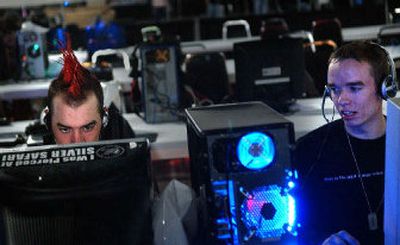EWU battles for edge

Eastern Washington University’s newest degree program in game design may sound like a lot of fun.
But slackers need not apply.
“We don’t want the kid who wants to play computer games all day. We want our students to be the crème de la crème,” said Brian Kamp, a computer science instructor at EWU. “This is a real difficult degree to get.”
EWU’s new bachelor’s degree in computer science with an emphasis on 3-D animation and game development is the region’s first four-year program in that field. Eastern is one of a handful of schools in the country that are expanding their programs to keep up with the booming world of “Grand Theft Auto” and “The Sims.”
Eastern will list its new program in catalogs this fall and could grant its first degrees to students already studying related subjects by next spring, said Stu Steiner, a computer science instructor who developed the degree program with help from Kamp.
“We have a tendency to look at computer games as a passing fancy,” Kamp said. “But this is a $3 billion industry in the state of Washington.”
That’s the state’s estimate for its “interactive media” industry, which includes some mobile phone services and which is located almost solely on the West Side. Two of the three biggest video game console makers are in the Puget Sound area – Microsoft and Nintendo.
Kamp and Steiner say they hope Eastern’s program will contribute to more game development on the East Side. They’ve got a booth at this weekend’s GameFest Spokane at the convention center.
Video and computer games have become a huge business, accounting for more than $7 billion in U.S. sales in 2004, according to the Entertainment Software Association, an industry group. The ESA says that in a 2004 survey, about half of Americans said they planned to buy a game in 2005.
A Chronicle of Higher Education story in 2005 noted that there had been an expansion of video-game design programs around the country, though many of those were not full four-year degrees.
One of the country’s top game designers, Warren Spector, told the Chronicle that, “It really is only a matter of time before game-development education is as well respected and as ubiquitous as film studies.”
Kamp and Steiner said the industry tends to have a division of labor between the artistic side and the computer-programming side. They want their graduates to be adept at both – kind of “superdevelopers,” Kamp said.
“The idea of this is to bridge the gap between” designers and programmers, he said. “What we’re hearing from game shops is we’re looking for people who at least understand what both sides do.”
The skills related to designing and developing games relate to other fields as well, the EWU instructors said, such as movie-making and forensic modeling in scientific work.
“It’s such a new industry, we don’t even know what all they’ll end up doing,” Kamp said.